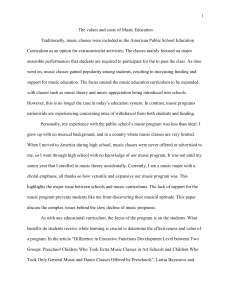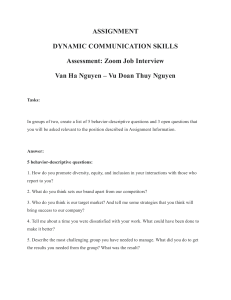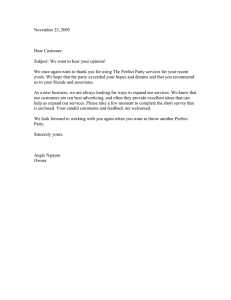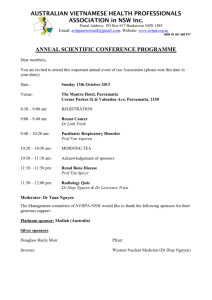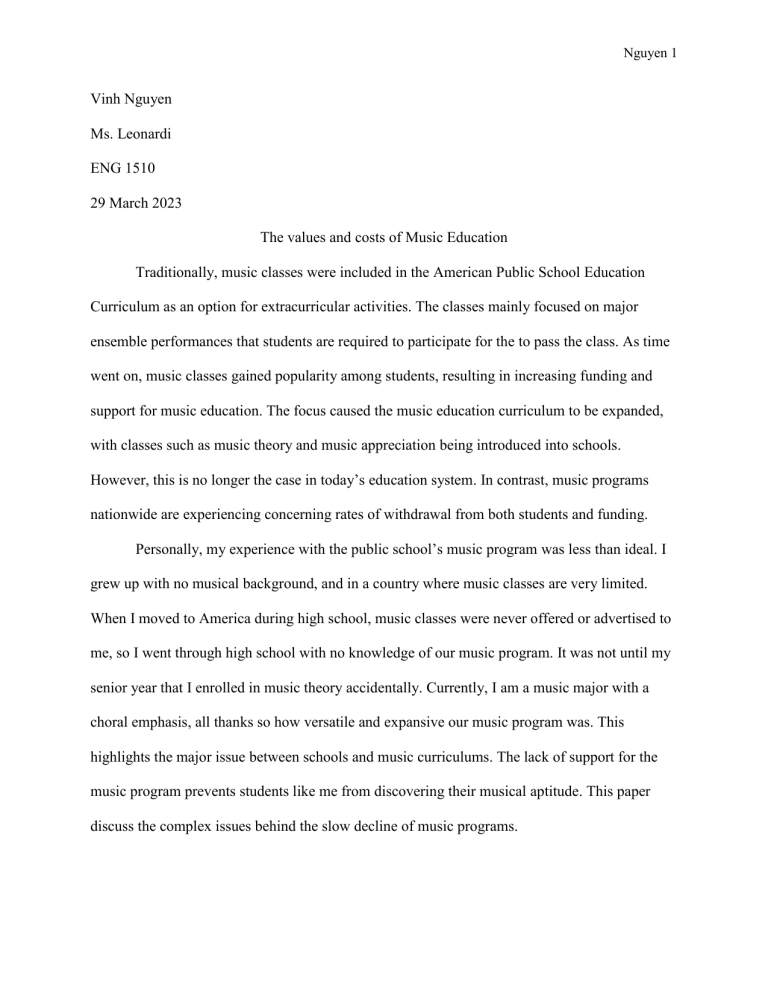
Nguyen 1 Vinh Nguyen Ms. Leonardi ENG 1510 29 March 2023 The values and costs of Music Education Traditionally, music classes were included in the American Public School Education Curriculum as an option for extracurricular activities. The classes mainly focused on major ensemble performances that students are required to participate for the to pass the class. As time went on, music classes gained popularity among students, resulting in increasing funding and support for music education. The focus caused the music education curriculum to be expanded, with classes such as music theory and music appreciation being introduced into schools. However, this is no longer the case in today’s education system. In contrast, music programs nationwide are experiencing concerning rates of withdrawal from both students and funding. Personally, my experience with the public school’s music program was less than ideal. I grew up with no musical background, and in a country where music classes are very limited. When I moved to America during high school, music classes were never offered or advertised to me, so I went through high school with no knowledge of our music program. It was not until my senior year that I enrolled in music theory accidentally. Currently, I am a music major with a choral emphasis, all thanks so how versatile and expansive our music program was. This highlights the major issue between schools and music curriculums. The lack of support for the music program prevents students like me from discovering their musical aptitude. This paper discuss the complex issues behind the slow decline of music programs. Nguyen 2 As with any educational curriculum, the focus of the program is on the students. What benefits do students receive while learning is crucial to determine the effectiveness and value of a program. In the article “Difference in Executive Functions Development Level between Two Groups: Preschool Children Who Took Extra Music Classes in Art Schools and Children Who Took Only General Music and Dance Classes Offered by Preschools”, Larisa Bayanova and colleagues presented the findings of their research: “Our study revealed that children taking extra music classes had a higher level of cognitive flexibility, than their peers who took only general music and dance classes.” This result is critical, as it supports the claimed benefits of music curriculums with concrete evidence. Bayanova’s findings contradicts common arguments brought against music classes, such as they are extra and does not help students develop useful skills. “By using correlation Pleiades, our work revealed that the children who took regular extra music classes in art schools demonstrated better coordination of the development of different [Executive Functions] components than children from the ‘general music and dance’ group.” (Bayanova). Again, she strongly argues that music programs help students develop the necessary skills much faster and better than others, and therefore they are very important to a child’s development. Though music may not look as challenging as its relative subjects, research shows that music challenges students in many unique ways, encouraging them to improve various skills through entertaining participation. Although students’ experiences are crucial, parents also have lots of control over what the students are allowed to study. Parents are the driving force behind the students, therefore their opinions toward music programs are very important. In Adrienne Rodriguez’s article “Parents’ Perceptions of Early Childhood Music Participation”, she stated: “[Parents] wanted their children to have early musical experiences and desired to provide their children with opportunities to Nguyen 3 socialize and connect with their local community.” For her studies, Rodriguez created an ideal musical environment for young children and their parents, with a variety of educational activities aimed to expose students the various forms of music creation. The result was astoundingly positive: “Parents enjoyed many aspects of music classes including learning about their child, their interests and seeing them develop musically. Some participants also noted that their child developed a sense of comfort or safety in music class” (Rodriguez). These findings further strengthen the support for music education, emphasizing its importance for both students and parents. It provides an opportunity for parents to deepen their connection with their children, and allow the children grow in a safe environment. Though proven beneficial, the music curriculum still carries many flaws. Specifically, an investigation was conducted in 2015 on why students do not participate in music courses: “The results indicated the school music program operated in a manner that blocked opportunities for enrollment in several ways. These included prerequisites of the music program (instrumentation and skill), time requirements outside the school day, and associated costs/fees of transportation, instruments, and trips” (Pendergast). Current music programs proved to be too challenging and unwelcoming toward beginners. Students and parents are required to invest lots of time and money to be able to participate, and for some parents this is the defining factor on why they are hesitant to enroll their students in music classes. Pendergast also mentions: “Both broad social norms (e.g., ethnicity, gender, and cultural norms) and personal social norms (e.g., family and friendship groups) seem to have an influence on participation in school music programs. To illustrate, several scholars have shown that some males are reluctant to sing in school choirs because of negative cultural stereotypes associated with males and singing.” Currently, problems that music student faces such as judgments and stereotypes are not being dealt with effectively. Nguyen 4 This results in both the students and parents being reluctant to join music programs, despite its proven benefits. In conclusion, music education has been proven to be greatly beneficial, with multiple research supporting its value toward children’s development and parental involvement. Music classes can facilitate an incredible learning environment and provides both students and parents with opportunity for growth. However, there remains issues with higher levels of music education. The requirements of dedication for both parents and students proved to be a big challenge for newcomers. Changes needs to be executed, with more support from schools and programs to encourage new people. Nguyen 5 Work Cited Bayanova, Larisa, et al. “Difference in Executive Functions Development Level between Two Groups: Preschool Children Who Took Extra Music Classes in Art Schools and Children Who Took Only General Music and Dance Classes Offered by Preschools.” Education Sciences, vol. 12, Jan. 2022. EBSCOhost, search.ebscohost.com/login.aspx?direct=true&db=eric&AN=EJ1340479&site=edslive&scope=site. Pendergast, Seth. "Understanding participation in secondary music classes: A literature review." Update: Applications of Research in Music Education 39.1 (2020): 38-49. Rodriguez, Adrienne M. “Parents’ Perceptions of Early Childhood Music Participation.” International Journal of Community Music, vol. 12, no. 1, Feb. 2019, pp. 95–110. EBSCOhost, https://doi-org.proxy.library.ohio.edu/10.1386/ijcm.12.1.95_1.
